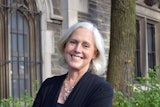PRINCETON, N.J. – If the nation wanted to design a system for funding public schools “to guarantee that poor children would get the least of everything that they needed in terms of an adequate education,” it could not find a better model than the current one, U.S. Rep. Chaka Fattah, D-Pa., told attendees at a conference on Saturday hosted by the Educational Testing Service (ETS) in Princeton, NJ.
Because schools in the United States are funded through property taxes in local districts, poor areas generally do not have financial resources comparable to wealthier communities, he emphasized. The congressman, whose district covers large portions of urban Philadelphia, has been at the forefront of efforts to address the effects of this imbalance on schools through legislation.
Fattah was an advocate for the Obama administration’s creation earlier this year of the Equity and Excellence Commission to examine the effects of school finance structures on educational opportunity and recommend reforms.
“We actually do know how to have a public school system that works in terms of education excellence,” Fattah said in his keynote speech. “We see it in public schools in our suburban communities, wealthy suburban communities all across the land. These schools work very, very well. What we need to do is provide that same opportunity to all children.”
Later in the day, Robert Moses, a civil rights movement legend who is president and founder of the Algebra Project, a foundation devoted to immersing disadvantaged students in rigorous math curriculums, noted that “the greatest discrepancies in school funding are between states, not within states,” where current efforts to balance resources have focused attention.
Moses asked participants to consider whether the nation is ready to have “a national conversation about a constitutional amendment to guarantee a constitutional right to an education” as he has long advocated.
A Harvard-trained educator who was a field secretary of the Student Nonviolent Coordinating Committee, Moses edited a book on that issue, Creating a Grassroots Movement to Transform Public Schools, Quality Education as a Constitutional Right, (Beacon, 2010).
The conference “Advancing Equity: Removing Roadblocks to Achieving High Academic Standards” was convened by ETS, along with the Council for Opportunity in Education (COE), the Education Law Center (ELC), and the National Urban League (NUL). The meeting brought together 140 educators, policymakers, lawmakers and others to discuss ways “to achieve educational excellence for all students regardless of social class, locale, race or gender.”
Dr. Michael Nettles, a leading expert on achievement gaps who is senior vice president of ETS’s Policy Evaluation and Research Center, said, “This is an era of common core state standards and other types of standards for performance.”
He said the gathering “allows us to think about what these common core state standards are, how the communities we have been working with for decades to achieve equity and quality will be able to achieve these high standards and how we might go about measuring and supporting the work of the people who are trying to work on these issues every day.”
In convening the conference, ETS said, “Achievement and opportunity gaps among races and socio-economic status population groups become apparent in pre-school, persist through elementary and secondary grades, and continue into college.”
ETS reported last year that progress in narrowing the gap between Blacks and Whites in educational results had stalled. Even more alarmingly, it said, “some research indicates that reaching equality could take 50 to 100 years if current patterns continue.”
An analysis by the National Center for Education Statistics in 2009 and 2011 showed that Black and Hispanic students trailed their White peers by an average of more than 20 test-score points—approximately two grade levels—on the National Assessment of Educational Progress math and reading assessments for fourth and eighth graders.
Dr. Edmund W. Gordon, professor emeritus, Teacher’s College, Columbia University, who wrapped up the conference, was critical of efforts to improve schools through such assessments.
He said they have led to an “overdependence and excessive use of standardized tests in the interest of accountability, so much so that the use of standardized tests is distorting the teaching and learning process and has led to cheating” among educators and administrators.
“Over the last 100 years in this country, the most consistent predictor of academic achievement is family income, family stability, the quality of life of families,” he added. “If we really want to close the achievement gap, we have to close the income gap, change the access that people of different statuses have to the power and resources of the society.”
















